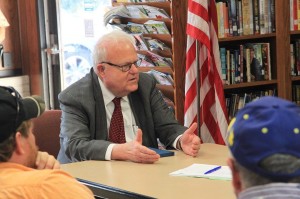Second Chance Month Q&A: U.S. Representative Jim Sensenbrenner
Topics:
Second Chance Act
By CSG Justice Center Staff
 U.S. Representative Jim Sensenbrenner (R-WI).
U.S. Representative Jim Sensenbrenner (R-WI).
This Second Chance Month, The Council of State Governments Justice Center staff asked elected leaders across the country why reentry is important to them and the communities they govern. Below, find U.S. Representative Jim Sensenbrenner’s (R-WI) reasons why #ReentryMatters.
What does reentry mean to you?
Criminal justice reform has been incredibly important to me for the past decade. In the beginning, I was one of the few Republicans even willing to discuss the issue. Fortunately, today’s political climate has become more accepting of the reality that roughly 95 percent of all people who are incarcerated will reenter society, and that it is important that we break the pattern of recidivism by helping them make a smooth and successful transition back into the community. We can do this by providing job training and strong mentorship programs to assist those leaving prison find jobs, make constructive choices, and avoid reoffending.
In the past decade, what specific progress would you point to regarding reentry?
Since the Second Chance Act was implemented, more than 160,000 men, women, and youth have benefitted from Second Chance Act grants. For example, in my home state of Wisconsin, we saw a 20 percent decrease in recidivism over a 10-year period after implementing reentry support programs. I’d call that a success. Others did, too—after seeing the benefits of the Second Chance Act, we reauthorized it in last year’s criminal justice reform package, known as the First Step Act. With that legislation, we strengthened the programs that proved most successful and cut the ones that are now unnecessary. This bipartisan reauthorization will allow us to build upon those successes.
What issue—or issues—elated to reentry do you want to address in 2019?
Ensuring that the First Step Act is properly implemented and fully funded is a top priority.
Why should an average citizen, not necessarily connected to any part of the criminal justice system, care about reentry?
Many people are probably more connected in some way to a someone who is formerly incarcerated than they think—whether it be in the workplace, at church, or in their neighborhood. However, even if one wasn’t connected in any way, the average citizen should care because our country spends an incredible amount of money to keep people in prisons. As a society, we should want to invest the time and resources in helping people stay out of prison, saving taxpayer dollars in the long run.
If you could say something directly to a person on the verge of leaving prison or jail and reentering society, what would you tell them?
I’d tell them: if you want another opportunity—a second chance—to live a productive life as a member of society, know that there are plenty of people and resources to help you to do so, and I urge you to utilize them. But ultimately, the choice is yours, and yours alone, to make.



